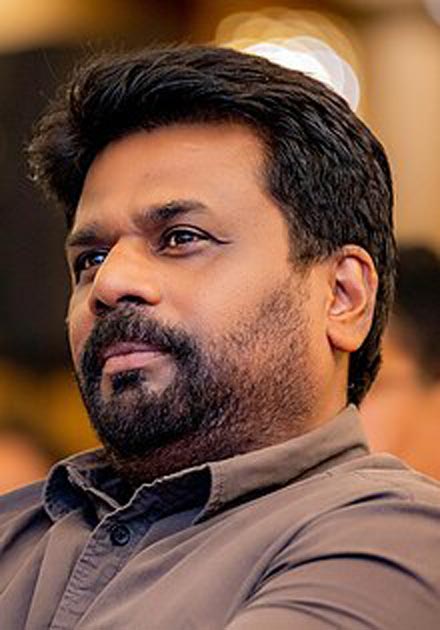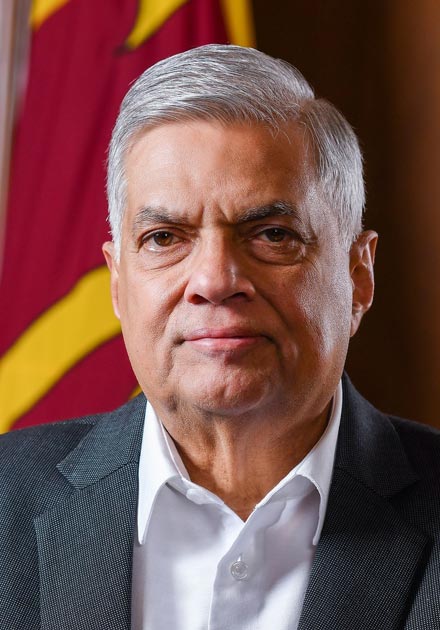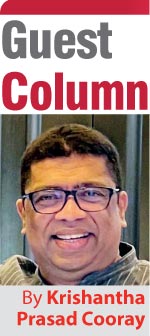Monday Feb 16, 2026
Monday Feb 16, 2026
Thursday, 26 September 2024 00:00 - - {{hitsCtrl.values.hits}}

President Anura Kumara Dissanayake

Former President Ranil Wickremesinghe
|
 On the morning of 13 July 2022, nothing seemed certain about Sri Lanka. Just two months prior, the country had declared bankruptcy and defaulted on more than $ 50 billion of sovereign debt. Its self-styled ‘patriotic’ president had just fled the country, cowering in the back of a cargo plane. For several days, it was not clear who was running Sri Lanka. It seemed certain to citizens and prognosticators alike that the country would follow firmly in the footsteps of Venezuela, Argentina, or Tunisia, with popular uprising leading to a further backslide into autocracy and economic paralysis.
On the morning of 13 July 2022, nothing seemed certain about Sri Lanka. Just two months prior, the country had declared bankruptcy and defaulted on more than $ 50 billion of sovereign debt. Its self-styled ‘patriotic’ president had just fled the country, cowering in the back of a cargo plane. For several days, it was not clear who was running Sri Lanka. It seemed certain to citizens and prognosticators alike that the country would follow firmly in the footsteps of Venezuela, Argentina, or Tunisia, with popular uprising leading to a further backslide into autocracy and economic paralysis.
No one could have predicted, on that Wednesday morning, that in just over two years, Sri Lanka would replenish its foreign reserves, amend the constitution to partly undo the authoritarian carte blanche of the 20th Amendment, successfully renegotiate its debt, retain the independence of the judiciary and independent commissions, and hold what would become the most complex and peaceful Presidential election in its history. Predicting any one of those things in July 2022 would have sounded optimistic. Predicting that they would all happen would have been sheer lunacy.
Ranil Wickremesinghe is no longer President because these accomplishments alone were not enough for voters to entrust him with another five years to captain the ship of state. However, as he announces his retirement from electoral politics, he has cemented his legacy by, for the third time in 15 years, taking the reins of a country in crisis and steering it away from the edge of oblivion.
Just as he did as Prime Minister in 2001 and 2015, as President in 2022 Wickremesinghe wasted no time explaining the gravity of the situation, engaging stakeholders both foreign and domestic, and rescuing the country from certain economic calamity. But just like in 2001 and 2015, Wickremesinghe once again found himself handicapped by the hand he was dealt.
In 2001 and 2015, he was beholden, as Prime Minister, to presidents who tolerated him and eventually clashed with him. In 2022, as President, he was forced to make do with the cabinet, parliamentary majority, and state apparatus left to him in trust by the Rajapaksa family. Wickremesinghe has often invited Sri Lankans to imagine what he could accomplish if he were elected president and empowered to choose his own cabinet and team.
Cut off from reality
However, whether in his terms as Prime Minister or most recently as President, he became seen as a leader who surrounded himself with personal staff who seemed more interested in their own political and personal enrichment than in the plight of ordinary citizens. He allowed himself to be cut off from reality and dissenting opinions by those who had neither his nor the citizenry’s interests at heart, rather than building a team who could take his message to the people and put their interests first. It is in large part due to this failure that he has never been given the opportunity he has sought so doggedly since taking over leadership of the UNP 30 years ago.
Despite rescuing Sri Lanka from economic calamity over the last two years in a way no one else dared even attempt, Wickremesinghe is seen as particularly indifferent to the suffering of the poorest Sri Lankans, while those around him were widely perceived to be prospering out of touch.
One can only hope that history remembers him not for these tragic political failings, but as the leader who thrice rescued Sri Lanka’s economy, abolished criminal defamation, outfoxed and splintered the LTTE, setting the stage for their eventual demise, and architected the progressive 17th, 19th, and 21st amendments to the constitution.
Last week, the sun set on the Wickremesinghe presidency as we learned that 5.7 million Sri Lankans, hailing from every ethnic community, rich and poor, old and young, men and women alike, have chosen to entrust Anura Kumara Dissanayake to succeed where they felt Wickremesinghe had failed.
One of the most striking characteristics of Sri Lanka’s newly elected President is that he remains something of an enigma for many who have not closely followed or supported him. For all of his political savvy, Dissanayake is perhaps the first President in Sri Lanka’s history to not employ a team dedicated to ‘spinning’ his personal image in the media. This has made it easy for his political rivals to frame and pigeonhole him with unflattering labels.
He is labelled an ‘anti-intellectual’ because few know that Dissanayake is the first President ever elected by Sri Lankans to have completed a bachelor’s degree. He is labelled an anarchist or autocrat in the making, despite having played a pivotal personal role in every attempt to defeat the Rajapaksas since 2005, including the 52-day coup of 2018, and having been one of the strongest liberal voices in support of every major piece of liberal constitutional reform proposed or enacted since he took over the JVP and formed the NPP. He is called a far-left communist, despite having run twice on platforms that emphasise a critical role for a vibrant private sector devoid of crony capitalism, and despite holding policy positions in line with most centre-left governments in Europe, Australia, or Canada.
Contrast this with the election of Gotabaya Rajapaksa as President in 2019. Rajapaksa, with a fraction of Dissanayake’s qualifications, quit the army at the height of the war and put Sri Lanka behind him, renouncing his citizenship and pledging allegiance to another country, returning to Sri Lanka only to take power as his brother’s defence secretary.
In 2019, he proudly embraced his reputation as a cold-blooded “terminator”, spun up the astroturf “Viyathmaga” movement to brand himself as an intellectual and campaigned almost entirely catering to majoritarian fearmongering. Yet his rise was widely hailed as that of a savvy, patriotic technocrat who would unite Sri Lanka.
|
Governed through fear and xenophobia
Rajapaksa went on to turn the machinery of the state against his perceived enemies, doing so even before appointing a cabinet. He governed through fear and xenophobia, torturing Muslims during COVID by ordering the cremation of their remains without basis, and eventually imploded the economy through pseudo-scientific mismanagement of astrological proportions.
In contrast, the 55-year-old Dissanayake has demonstrated integrity and political savvy throughout the 10 years since he was elected leader of the Janatha Vimukthi Peramuna (JVP). He has distinguished himself from other party leaders by being extraordinarily wary of power for power’s sake, and for taking politically courageous decisions that were in the country’s best interests, while being to his or his party’s political detriment.
The first of these took place in London, in May 2014. Shortly after assuming leadership of the JVP, he openly apologised for the carnage wrought by earlier iterations of his party during the violent insurrections of 1971 and 1987, and shared his perspectives on those tragedies with rare candour. Less than a year later, he threw the weight of the JVP behind the united opposition parties who rallied to defeat the authoritarian Rajapaksa regime in 2015. Despite being pivotal to electing Maithripala Sirisena as President, Dissanayake turned down overtures for his party to join a coalition government, eschewing the trappings of cabinet ministries to serve as a watchdog against state excess from the opposition benches of Parliament.
As an MP, Dissanayake demonstrated a strong understanding of parliamentary procedure, the role of committees, and constitutional law. During the 52-day coup in 2018, when former President Rajapaksa illegally purported to assume the office of Prime Minister, Dissanayake, without hesitation, rallied the JVP to rescue the unpopular incumbent regime. He knew that doing so was politically suicidal for his party but insisted on standing up for democracy and the rule of law, no matter the cost.
Just this weekend, as his victory became assured, his first priority was trying to unite the country. He encouraged his supporters to refrain from celebrating his victory. Winning an election is not something to celebrate, he said, but rather an opportunity to accomplish something worth celebrating. He reaffirmed his commitment to the IMF pact, putting to rest fearmongering that he would tear it up. His inauguration remained a low-key affair, sans fanfare, attended not just by leftists, but by several senior business leaders and professionals from the very echelons of society that we were supposed to have the most to fear from an AKD regime.
|
Ability to remain down-to-earth
Much of Dissanayake’s appeal to voters comes from his ability to remain down-to-earth, even as he has transformed into a political phenomenon virtually overnight. I saw this firsthand in 2015, barely a year after he assumed leadership of the JVP. One of his party cadres, a domestic aide who was known to me, was suffering from heart disease, hospitalised and about to undergo a dangerous surgery. He didn’t know if he would live or die.
Before undergoing his operation, Somapala had one request. He wondered if it would be possible for him to meet his party’s leader, Anura Dissanayake, whom he admired, and speak to him face-to-face. When I passed the request on to Dissanayake, he made his way to the hospital without delay. I greeted him on arrival, and as I walked him to Somapala’s room, Dissanayake peppered me with questions about his background and condition.
When I watched him by that hospital bed, I could not tell who was more awestruck by whom. Dissanayake told Somapala he had nothing to worry about, promising to return to check on him after the surgery. And he did.
Dissanayake has spent the past decade quietly visiting people like Somapala – his supporters and detractors alike – from widely differing political backgrounds, exposing himself to a diversity of opinions, and driving a movement to combine the integrity of his former insurrectionist party with the diversity and political acumen of the wider NPP coalition.
No one can predict what kind of leader Anura Kumara Dissanayake will become. But one thing we can be sure of is that Sri Lanka has never elected a leader quite like him.